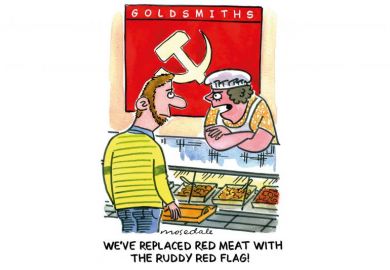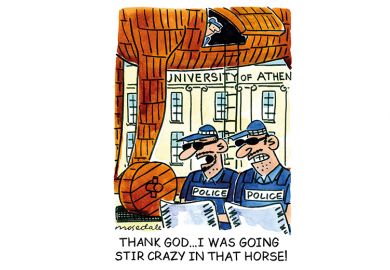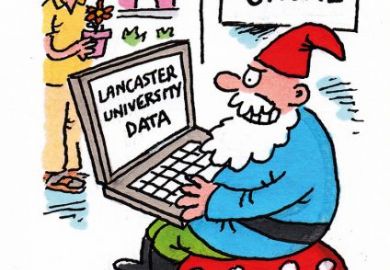
Brexit will undoubtedly be a topic of scholarly study for decades to come, but a surprising institution has got itself ahead of the curve: the University of Botswana. The Irish Times reported that Bruce Bennett, a senior lecturer in the institution’s history department, had organised the elective course, arguing that Brexit was of special interest to the landlocked former British colony. “There’s interest about the potential economic impacts…There is a lot of trade with Botswana. No one is really sure what it means,” echoing the sentiments of many people in the UK, too. Fittingly, the course will have no final exam, suggesting that students on the module might find that, like Brexit itself, there is no end in sight.
One of the more eye-catching higher education headlines of recent years could be found in The Times on 23 August: “Professor swaps wife for octopus.” The story focused on David Scheel, professor of marine biology at Alaska Pacific University, who spent a year living with an octopus after his divorce – an experience that was charted in a BBC documentary, Natural World: The Octopus in my House. Professor Scheel found that Heidi, a big blue octopus, offered more than an eight-armed embrace, explaining: “We had a nice routine. I’d sit down to do my email next to the aquarium. She would do her morning grooming.” The octopus learned to set off a buzzer to summon her human partner, and she even joined family television sessions with Laurel, Professor Scheel’s teenage daughter. “Laurel maintained Heidi liked comedies the best, but Blue Planet II has to be right up there,” the newspaper quoted Professor Scheel as saying.
When it came to seeing higher education’s brightest and best on screen, University Challenge used to be the place to go. But – Professor Scheel’s escapades aside – it seems that The Great British Bake Off might be a good bet, too. Hot from the success of University of Sheffield research scientist Rahul Mandal in last year’s contest, this year’s competition – which started airing on 27 August – features Harry Bird, a 20-year-old English literature student at Durham University. Mr Bird told the website This is Local London that he had been trying out his cakes, pastries and patisseries on housemates at Collingwood College. Asked about one of his creations, inspired by a happy memory of a university party, Mr Bird proved that he had time for more traditional student pursuits, too. “It would be quite a busy, chaotic cake flavoured with alcohol to represent the party, so perhaps a Kahlúa coffee drizzle and vodka buttercream icing,” he said.
The saga of the dean of Christ Church, Oxford, seems to have been running for almost as long as Brexit. The Very Rev Martyn Percy was suspended last September, charged with “immoral, scandalous or disgraceful” conduct, but has now been reinstated by a tribunal, The Times reported. The charge had led to suggestions that Dr Percy had been accused of bullying, but it later emerged that he had simply requested a pay rise, with friends suggesting that his reputation as a moderniser might have made him enemies. With the investigation having lasted nearly a year and cost Christ Church more than £500,000, it is now the college’s turn to face criticism. The Rev Robin Gibbons, a canon at Christ Church, told The Times that the college’s sluggishness in clarifying the nature of the complaints amounted to “calumny by omission” and that he was “appalled at the way [Dr Percy’s] name had been dragged through the mud”.
One institution taking steps to atone for its past actions is the University of Glasgow, which has committed to raising and spending £20 million to make amends for how it historically benefited from the slave trade. The funds will be used to create a centre for development research, being set up jointly with the University of the West Indies. The move follows the publication of a report earlier this year that found that Glasgow had received gifts from several individuals connected to the slave trade during the 18th and 19th centuries, with an estimated modern value of between £16.8 million and £198 million. “Talking about any institution’s or country’s historical links to slavery can be a difficult conversation,” said Sir Anton Muscatelli, Glasgow’s principal, “but we felt it was a necessary one for our university to have. I am reminded of the words of Sir Geoff Palmer, one of our report’s external advisers, who often says while you can’t change the past, you can change its consequences.”
Register to continue
Why register?
- Registration is free and only takes a moment
- Once registered, you can read 3 articles a month
- Sign up for our newsletter
Subscribe
Or subscribe for unlimited access to:
- Unlimited access to news, views, insights & reviews
- Digital editions
- Digital access to THE’s university and college rankings analysis
Already registered or a current subscriber?





